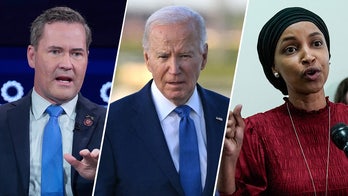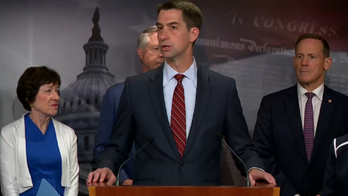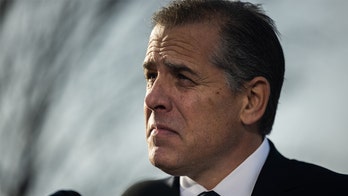Recent CBO report warns of recession
Kevin McCullough & Penny Lee debate what it means for the economy & 2012 presidential election
This is as good as it gets -- 8 percent unemployment, and economic growth of 1.7 percent.
That projection for 2013 was embedded in a sprawling economic report released this week by the nonpartisan Congressional Budget Office, and it underscored how dire the economic forecast looks.
The figures cited above reflect a sort of best-case scenario for the U.S. economy next year. Only if lawmakers avert a wave of scheduled tax hikes and only if lawmakers stop a battle ax of cuts to the Defense Department and other areas can the economy achieve 8 percent unemployment and 1.7 percent growth.
In normal times, those would be dour figures.
But here's the alternative. The CBO projected in its report that if Congress does nothing -- meaning, if it allows the tax hikes and spending cuts to go into effect -- the economy could dip back into recession.
Without any changes, the report projected the economy would contract by .5 percent by the end of 2013, and unemployment would rise to 9.1 percent. The jobless rate is 8.3 percent now.
"CBO expects that such fiscal tightening would lead to what will probably be deemed a recession, with growth in GDP declining in 2013," the report said.
The CBO outlined in stark terms the choice for policymakers, who aren't likely to get to the business of addressing the problem until after the election, in a last-minute, lame-duck session.
On one hand, they could let the economy take the hit and endure the possibility of recession. In exchange, the deficit is projected to drop from $1.1 trillion this year to $641 billion next year.
If, though, they decide to extend the Bush-era tax rates and put off the spending cuts, lawmakers can avert the projected recession. But in exchange for the just-modest economic growth, the deficit next year could be nearly $400 billion bigger. That means the deficit would top $1 trillion for the fifth straight year, with the national debt already on track to hit $16 trillion any day now.
"Diverting from that path to continue current tax and spending policies would improve the economic outlook in the short run but would boost deficits and debt significantly and would place the budget on a path that is ultimately unsustainable," the CBO report warned.
With the economy caught between the so-called "fiscal cliff" and dire deficit concerns, both presidential candidates have tried to promote their own prescriptions.
President Obama wants Congress to let the tax rates expire for top earners but extend them for everyone else, and he has blamed Republicans for standing in the way.
"Unfortunately, Republican intransigence, their insistence that millionaires and billionaires get tax cuts, has prevented the completion of an agreement on a balanced plan," White House Press Secretary Jay Carney said Thursday. "What we do know ... going to the CBO report, is that the single biggest component of the so-called fiscal cliff is the middle-class tax cuts that Republicans and Democrats all agree ought to be extended."
They don't agree on the particulars, though. Romney and congressional Republicans want the tax rates extended for everyone and blame Democrats for holding up such a deal.
As for the scheduled defense cuts, GOP running mate Paul Ryan called on Obama on Thursday to "put up or shut up" -- show how his administration will implement the cuts or help Congress avert them.
"The Senate has done nothing. The president has done nothing. The president has proposed no solution to this," Ryan said.





